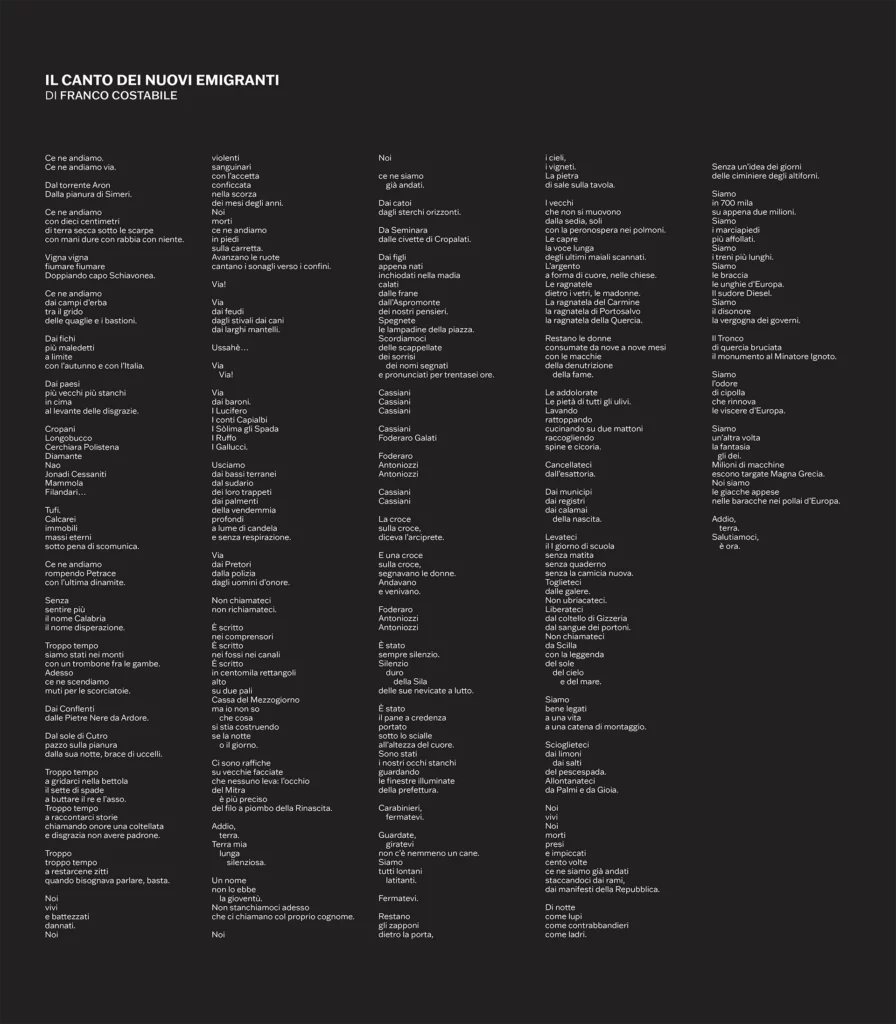Franco Costabile
was born on August 27, 1924, in Sambiase (CZ). Just a few months after his birth, his father abandoned the family, moving to Tunisia to pursue a teaching career. This created a painful void in Costabile's life, counterbalanced by a profound bond with his mother and with Calabria, the Great Mother that ensnared him in a symbiotic and ambivalent love, oscillating between escape and vindication, between mythologizing and repulsion. After completing his studies at the Classical High School in Nicastro, in 1943, Costabile enrolled in the Faculty of Letters at the University of Messina. He collaborated with "L’Italia libera" of the Action Party, wrote for "Calabria, terra dimenticata," and founded the periodical "La via." In 1946, driven by a desire for growth and recognition, he left Sambiase for Rome, where he continued his studies in the Faculty of Letters. There, he became a favored student of the poet Giuseppe Ungaretti, who was then a professor of Contemporary Literature; the two became like lost father and son to one another. After graduating, Costabile taught Italian and History in various high schools and technical institutes from 1946 to 1961, always in precarious and commuting positions. During this time, he also worked on a Catholic encyclopedia and collaborated with several magazines—two of which were purely literary ("La fiera letteraria" and "Letteratura"), while the others had a civil focus ("Tempo presente," "Botteghe oscure," "Inventario," "L’Europa letteraria"), where he published his first poems, also sending them to Elio Vittorini for feedback due to their epistolary relationship. Well-integrated into the Roman literary scene, he forged connections with contemporary poets, artists, and literary critics. In 1950, his first collection, Via degli ulivi, was well received. In 1953, he married his former student Mariuccia Ormau, with whom he had two daughters. However, his wife soon moved to Milan to teach at the Accademia di Brera, shattering his dream of a reconciled family life. As if to dive into and amplify his personal pain, he tied his individual suffering to social malaise, reflecting the grief of a people. This led to the creation of La rosa nel bicchiere, published by Canesi in 1961, which critics consider his masterpiece. It was nominated for the Viareggio Literary Prize and read on RAI by Valeria Moriconi. In the same year, Costabile's father stopped responding to his letters, severing the thin thread that Costabile had always sought to maintain contact through. In 1964, after a long illness, his mother passed away, further deepening Costabile's existential despair. Even the significant success of the poem Il canto dei nuovi emigranti, which won the Frascati Literary Prize and was performed by Achille Millo—a poem about the pain of a land, Calabria, plagued by incurable problems—could not lift his spirits. He felt a profound connection between the fate of his homeland and that of his mother. On April 14, 1965, Franco Costabile took his own life. In remembrance of him, Giuseppe Ungaretti wrote these poignant verses: “With this heart too much of a storyteller,” you said, placing a rose in the glass, and the rose faded little by little like your heart, it faded to sing a tragic story forever.
The Song of the New Emigrants

